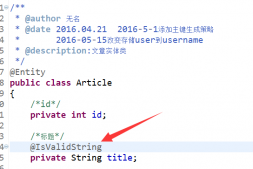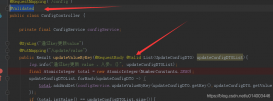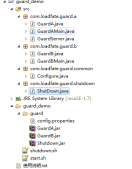java Iterator接口和LIstIterator接口分析
目录
1.Iterator接口
2.ListIterator
3.Iterator和ListIterator的区别
正文
在继续看ArrayList源码之前,先了解Iterator接口和ListIterator接口,下篇文章详细讲解ArrayList是如何实现它们的。
我们知道,接口只是一种规范,当继承接口并实现其中的方法时,要遵循接口对方法的说明。
1.Iterator接口
Iterator接口取代了Java集合框架中的Enumeratrion。Iterators不同于enumerations的地方主要有两点:
Iterators允许调用者在迭代过程中从集合里移除元素;
方法名得到了改善。
Iterator源码如下:
|
1
2
3
4
5
6
7
8
9
10
11
12
13
14
15
16
17
18
19
20
21
22
23
24
25
26
27
28
29
30
31
32
33
34
35
36
37
38
39
40
41
42
43
44
45
46
47
48
49
50
51
52
53
54
55
56
57
58
59
60
61
62
63
64
65
66
67
68
69
70
71
|
/** * An iterator over a collection. {@code Iterator} takes the place of * {@link Enumeration} in the Java Collections Framework. Iterators * differ from enumerations in two ways: * Iterators allow the caller to remove elements from the underlying collection during the iteration with well-defined semantics. * Method names have been improved. * This interface is a member of the Java Collections Framework. * @param <E> the type of elements returned by this iterator*/public interface Iterator<E> { /** * Returns {@code true} if the iteration has more elements. * (In other words, returns {@code true} if {@link #next} would * return an element rather than throwing an exception.) * @return {@code true} if the iteration has more elements */ boolean hasNext(); /** * Returns the next element in the iteration. * @return the next element in the iteration * @throws NoSuchElementException if the iteration has no more elements */ E next(); /** * Removes from the underlying collection the last element returned * by this iterator (optional operation). This method can be called * only once per call to {@link #next}. The behavior of an iterator * is unspecified if the underlying collection is modified while the * iteration is in progress in any way other than by calling this * method. * * @implSpec * The default implementation throws an instance of * {@link UnsupportedOperationException} and performs no other action. * * @throws UnsupportedOperationException if the {@code remove} * operation is not supported by this iterator * * @throws IllegalStateException if the {@code next} method has not * yet been called, or the {@code remove} method has already * been called after the last call to the {@code next} * method */ default void remove() { throw new UnsupportedOperationException("remove"); } /** * Performs the given action for each remaining element until all elements * have been processed or the action throws an exception. Actions are * performed in the order of iteration, if that order is specified. * Exceptions thrown by the action are relayed to the caller. * * @implSpec * <p>The default implementation behaves as if: * <pre>{@code * while (hasNext()) * action.accept(next()); * }</pre> * * @param action The action to be performed for each element * @throws NullPointerException if the specified action is null * @since 1.8 */ default void forEachRemaining(Consumer<? super E> action) { Objects.requireNonNull(action); while (hasNext()) action.accept(next()); }} |
Iterator接口定义了四个方法以及各个方法的功能,如果有类实现了这个接口,且实现了这些方法,这方法需要实现定义的功能,遵循这些规则:
1).hasNext() 判断容器是否有下一个元素,有则返回true;
2).next() 返回容器中的下一个元素;
3).remove() 移除当前迭代器返回的最后一个元素。这个方法在每次调用next()方法之后只能调用一次;
4).Java 8 增加forEachRemaining方法,它可以实现对余下的所有元素执行指定的操作。
更详细的说明请阅读源码中的注释。
2.ListIterator
ListIterator在Iterator基础上提供了add、set、previous等对列表的操作。但是ListIterator跟Iterator一样,仍是在原列表上进行操作。
ListIterator源码如下:
|
1
2
3
4
5
6
7
8
9
10
11
12
13
14
15
16
17
18
19
20
21
22
23
24
25
26
27
28
29
30
31
32
33
34
35
36
37
38
39
40
41
42
43
44
45
46
47
48
49
50
51
52
53
54
55
56
57
58
59
60
61
62
63
64
65
66
67
68
69
70
71
72
73
74
75
76
77
78
79
80
81
82
83
84
85
86
87
88
89
90
91
92
93
94
95
96
97
98
99
100
101
102
103
104
105
106
107
108
109
110
111
112
113
114
115
116
117
118
119
120
121
122
123
124
125
126
127
128
129
130
131
132
133
134
135
136
137
138
139
140
141
142
143
144
145
146
147
148
149
150
151
152
153
154
155
156
157
|
/** * An iterator for lists that allows the programmer * to traverse the list in either direction, modify * the list during iteration, and obtain the iterator's * current position in the list. A {@code ListIterator} * has no current element; its <I>cursor position</I> always * lies between the element that would be returned by a call * to {@code previous()} and the element that would be * returned by a call to {@code next()}. * An iterator for a list of length {@code n} has {@code n+1} possible * cursor positions, as illustrated by the carets ({@code ^}) below: * <PRE> * Element(0) Element(1) Element(2) ... Element(n-1) * cursor positions: ^ ^ ^ ^ ^ * </PRE> * Note that the {@link #remove} and {@link #set(Object)} methods are * <i>not</i> defined in terms of the cursor position; they are defined to * operate on the last element returned by a call to {@link #next} or * {@link #previous()}. * * This interface is a member of the Java Collections Framework.*/public interface ListIterator<E> extends Iterator<E> { // Query Operations /** * Returns {@code true} if this list iterator has more elements when * traversing the list in the forward direction. (In other words, * returns {@code true} if {@link #next} would return an element rather * than throwing an exception.) * * @return {@code true} if the list iterator has more elements when * traversing the list in the forward direction */ boolean hasNext(); /** * Returns the next element in the list and advances the cursor position. * This method may be called repeatedly to iterate through the list, * or intermixed with calls to {@link #previous} to go back and forth. * (Note that alternating calls to {@code next} and {@code previous} * will return the same element repeatedly.) * * @return the next element in the list * @throws NoSuchElementException if the iteration has no next element */ E next(); /** * Returns {@code true} if this list iterator has more elements when * traversing the list in the reverse direction. (In other words, * returns {@code true} if {@link #previous} would return an element * rather than throwing an exception.) * * @return {@code true} if the list iterator has more elements when * traversing the list in the reverse direction */ boolean hasPrevious(); /** * Returns the previous element in the list and moves the cursor * position backwards. This method may be called repeatedly to * iterate through the list backwards, or intermixed with calls to * {@link #next} to go back and forth. (Note that alternating calls * to {@code next} and {@code previous} will return the same * element repeatedly.) * * @return the previous element in the list * @throws NoSuchElementException if the iteration has no previous * element */ E previous(); /** * Returns the index of the element that would be returned by a * subsequent call to {@link #next}. (Returns list size if the list * iterator is at the end of the list.) * * @return the index of the element that would be returned by a * subsequent call to {@code next}, or list size if the list * iterator is at the end of the list */ int nextIndex(); /** * Returns the index of the element that would be returned by a * subsequent call to {@link #previous}. (Returns -1 if the list * iterator is at the beginning of the list.) * * @return the index of the element that would be returned by a * subsequent call to {@code previous}, or -1 if the list * iterator is at the beginning of the list */ int previousIndex(); // Modification Operations /** * Removes from the list the last element that was returned by {@link * #next} or {@link #previous} (optional operation). This call can * only be made once per call to {@code next} or {@code previous}. * It can be made only if {@link #add} has not been * called after the last call to {@code next} or {@code previous}. * * @throws UnsupportedOperationException if the {@code remove} * operation is not supported by this list iterator * @throws IllegalStateException if neither {@code next} nor * {@code previous} have been called, or {@code remove} or * {@code add} have been called after the last call to * {@code next} or {@code previous} */ void remove(); /** * Replaces the last element returned by {@link #next} or * {@link #previous} with the specified element (optional operation). * This call can be made only if neither {@link #remove} nor {@link * #add} have been called after the last call to {@code next} or * {@code previous}. * * @param e the element with which to replace the last element returned by * {@code next} or {@code previous} * @throws UnsupportedOperationException if the {@code set} operation * is not supported by this list iterator * @throws ClassCastException if the class of the specified element * prevents it from being added to this list * @throws IllegalArgumentException if some aspect of the specified * element prevents it from being added to this list * @throws IllegalStateException if neither {@code next} nor * {@code previous} have been called, or {@code remove} or * {@code add} have been called after the last call to * {@code next} or {@code previous} */ void set(E e); /** * Inserts the specified element into the list (optional operation). * The element is inserted immediately before the element that * would be returned by {@link #next}, if any, and after the element * that would be returned by {@link #previous}, if any. (If the * list contains no elements, the new element becomes the sole element * on the list.) The new element is inserted before the implicit * cursor: a subsequent call to {@code next} would be unaffected, and a * subsequent call to {@code previous} would return the new element. * (This call increases by one the value that would be returned by a * call to {@code nextIndex} or {@code previousIndex}.) * * @param e the element to insert * @throws UnsupportedOperationException if the {@code add} method is * not supported by this list iterator * @throws ClassCastException if the class of the specified element * prevents it from being added to this list * @throws IllegalArgumentException if some aspect of this element * prevents it from being added to this list */ void add(E e);} |
ListIterator的功能更加强大,定义的方法有:
1).hasNext() 向前遍历时,如果有下一个元素返回真;
2).next() 返回下一个元素的值,并将指针加1;
3).hasPrevious() 向相反方向遍历时,如果还有元素返回真;
4).previous() 返回上一个元素的值,并将指针前移1;
5).nextIndex() 返回此时调用next()方法时返回的元素的索引;
6).previousIndex() 返回此时调用previous()方法时返回的元素的索引;
7).remove() 移除最近一次调用next()或previous()方法返回的元素(可选);
8).set(E e) 用元素e将如果此时调用next()或previous()方法返回的元素替换掉;
9).add(E e) 添加元素到此时调用next()返回的元素之前,或此时调用previous()返回的元素之后。
更详细的说明请阅读源码中的注释。
3.Iterator和ListIterator的区别
Iterator和ListIterator的方法对比如下表:
|
Iterator |
ListIterator |
|
|
hasNext() |
hasNext() | 覆盖 |
|
next() |
next() | 覆盖 |
|
remove() |
remove() | 覆盖 |
|
forEachRemaining(Consumer<? super E> action) |
forEachRemaining(Consumer<? super E> action) | 继承 |
| hasPrevious() | ||
| previous() | ||
| nextIndex() | ||
| previousIndex() | ||
| set(E e) | ||
| add(E e) |
二者的不同之处主要有:
1).Iterator只能单向移动,ListIterator可以双向移动;
2).ListIterator可以删除、替换或添加元素,而Iterator只能删除元素;
3).ListIterator可以返回当前(调用next()或previous()返回的)元素的索引,而Iterator不能。
感谢阅读,希望能帮助到大家,谢谢大家对本站的支持!
原文链接:http://www.cnblogs.com/songwenlong/p/6910799.html















